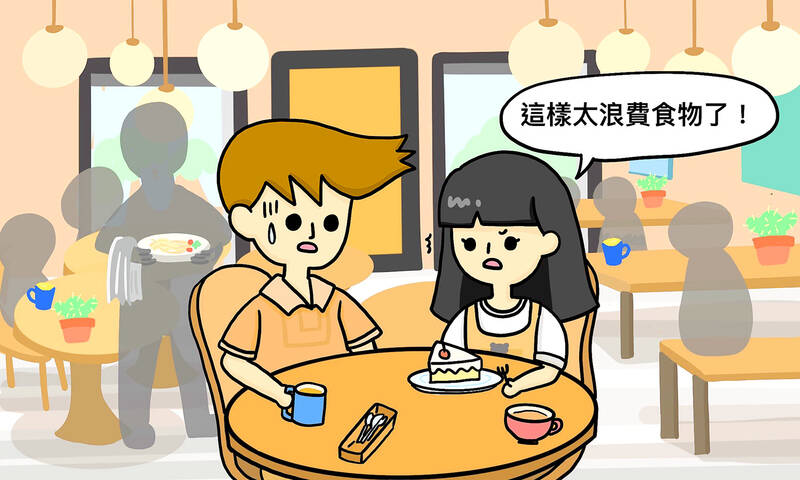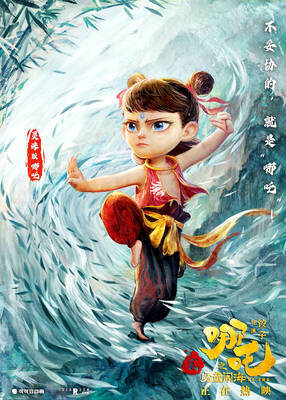對話 Dialogue
小實:馬克,你怎麼讓老闆收走了你的餐點?
Xiǎoshí: Mǎkè, nǐ zěnme ràng lǎobǎn shōu zǒu le nǐ de cāndiǎn?

馬克:因為我吃飽了。
Make: Yīnwèi wǒ chī bǎo le.
小實:吃飽了?可是你還有好多東西沒吃。
Xiǎoshí: Chī bǎo le? Kěshì nǐ háiyǒu hǎoduō dōngxi méi chī.
馬克:嗯,剛剛點餐的時候我好餓,所以一不小心就點太多了。
Make: Ēn, gānggāng diǎncān de shíhòu wǒ hǎo è, suǒyǐ yí bù xiǎoxīn jiù diǎn tài duō le.
小實:點餐以前,你應該要先想好要吃多少東西,要不然這樣太浪費食物了。
Xiǎoshí: Diǎncān yǐqián, nǐ yīnggāi yào xiān xiǎng hǎo yào chī duōshǎo dōngxi, yào bùrán zhèyàng tài làngfèi shíwù le.
馬克:會嗎?可是我都付了錢啊!
Make: Huì ma? Kěshì wǒ dōu fùle qián a!
小實:以前的臺灣人說,要是你不吃完碗裡的飯,以後的先生或太太臉上就會長滿痘痘。
Xiǎoshí: Yǐqián de Táiwān rén shuō, yàoshì nǐ bù chī wán wǎnlǐ de fàn, yǐhòu de xiānshēng huò tàitai liǎnshàng jiù huì zhǎng mǎn dòu dòu.
馬克:好啦!以後我會好好珍惜食物的。
Make: Hǎo la! Yǐhòu wǒ huì hǎohǎo zhēnxí shíwù de.
翻譯 Translation
Xiaoshi: Mark, why did you let the waiter take away your meal?
Mark: Because I’m full.
Xiaoshi: Are you full? But you still left a lot on the plate.
Mark: Well, I was so hungry when I ordered, so I may have ordered too much by accident.
Xiaoshi: Before ordering, you should think about how much you want to eat; otherwise it would be a waste of food.
Mark: Will it? But I paid for it!
Xiaoshi: There is a saying in Taiwan that if you don’t finish the rice in the bowl, your future husband or wife will have pimples on their face.
Mark: Alright! I will cherish food in the future.
單字片語 Vocabulary
1. 餐點 (cāndiǎn) meals
2. 點餐 (diǎncān) to order
3. 一不小心 (yí bù xiǎoxīn) accidentally
4. 要不然 (yào bùrán) otherwise
5. 浪費 (làngfèi) to waste
6. 食物 (shíwù) food
7. 長痘痘 (zhǎng dòu dòu) to have pimples/acne
8. 珍惜 (zhēnxí) to cherish
教材音檔 Audio Files
教材影片 Video Files:
https://www.instagram.com/celc.nou_tw/guide/_/17999106352646292/
實踐大學華語中心提供
By Shih Chien University Chinese Language Center: https://chineseusc.com/

Microsoft on Feb. 28 announced it was retiring Skype, the online voice and video call pioneer that the tech titan acquired in 2011. “Starting in May 2025, Skype will no longer be available,” said a post from Skype support on X, directing users to sign into Microsoft’s Teams platform for further use of its services. Skype was founded in 2003 by Scandinavians Niklas Zennstrom and Janus Friis in Estonia, revolutionizing Internet communication by offering free voice calls between computers and affordable rates for calls to landlines and mobile phones. Over the years, and as Internet speeds improved, Skype evolved to

A: China’s animated blockbuster “Ne Zha 2” also smashed a box office record recently. B: It’s No. 7 among the world’s best-selling films, grossing more than US$2 billion globally. A: I t has even become the world’s highest-grossing animated film, while the political metaphors in it are causing controversy. B: But who is Ne Zha anyway? A: Ne Zha, often spelled as “Nezha,” is actually a mythical teenage deity with superpowers. A: 中國動畫片《哪吒2》最近也打破紀錄。 B: 該片已衝上影史票房排行榜第7名,全球狂賣超過20億美元。 A: 聽說它甚至是全球最賣座的動畫片,影片中的政治隱喻卻引爆爭議! B: 但哪吒是誰? A: 哪吒的名字常被拼成「Nezha」,是神話中具有超能力的青少年神明。

People desire a sense of purpose in their lives, but they often remain idle unless they have a clear reason to act. This concept is illustrated by the retirement paradox. People work hard to prepare for a future without work but find life meaningless after achieving that goal. A study was carried out to determine if a reason, even a minor one, could encourage idle people to take action. __1__ Upon finishing the first, they were instructed to drop it off at a location either right outside the room or at a spot farther away, which would take around

A: Were there any highlights at the Oscars this year? B: With 13 nods, French director Jacques Audiard’s “Emilia Perez” broke the record for most Oscar nominations earned by a non-English film. A: Wow, it broke the record of 10 Oscar nominations set by Taiwanese director Ang Lee’s “Crouching Tiger, Hidden Dragon.” B: On the eve of the Oscars, Lee was honored with the Lifetime Achievement Award at the Directors Guild of America (DGA) Awards. A: It seems that Hollywood has finally become more diverse. A: 今年的奧斯卡獎有什麼亮點嗎? B: 法國導演賈克歐迪亞的《璀璨女人夢》榮獲13項提名,打破了非英語片紀錄! A: 哇打破了台灣導演李安的《臥虎藏龍》10項提名紀錄。 B: 李安則在奧斯卡前夕,獲頒美國導演工會「終身成就獎」。 A: 看來好萊塢終於比較多元化啦。 (By Eddy Chang, Taipei Times/台北時報張迪)